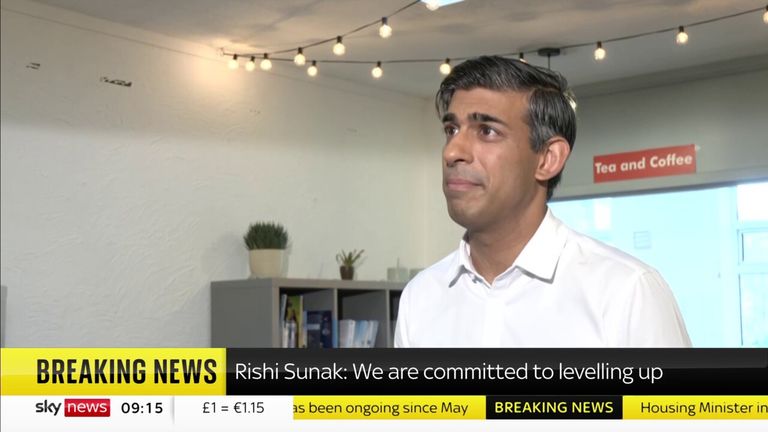With political party conference season upon us and the Tories scrambling for ways to appeal to voters and lessen Labour’s lead in the polls, abolishing inheritance tax has again been floated as the next government giveaway.
So, how many people are paying inheritance tax and how much are they paying: will abolition allow grieving loved ones to save thousands or is this a boon to the homeowning Tory base?
Or is this just a sensible policy measure benefitting both groups, given house prices are still more expensive than they were before the pandemic and inflation stood for months in double digit territory?
With widespread dislike of inheritance tax, the incorrect belief among taxpayers that they’ll fork out because of the toll, calls for abolition and reform coming from all corners, yet only small percentages of assets being affected by the charge, Prime Minister Rishi Sunak may have landed on a policy that few would miss in its current form.
It is after all what Tories call the “most hated tax”.
While only a small percent pay inheritance tax, new data from the Institute for economic research, Fiscal Studies (IFS) says the sums could be significant to some: if all non-spousal inheritances transferred next year were equally shared between all 25 years olds, each would receive around £120,000.
How many are paying?
Latest available figures from the tax man, His Majesty’s Revenue and Customs (HMRC), show 27,000 estates paid inheritance tax in the year 2020 to 2021. An estate encompasses a person’s assets: their house, any jewellery or other valuables they might own. Though inheritance tax isn’t paid on pension and insurance money.
For context, more than half a million (577,160) people died in England and Wales in 2022.
Essentially, less than 4% (3.73%) of estates paid inheritance tax in the 2020 to 2021 year.
And the number of estates paying inheritance tax is up by 4,000 people since the previous tax year, 2019 to 2020, as the numbers of people who died increased during the COVID-19 pandemic.
What are they paying?
At present, inheritance tax is charged at 40% and applies to estates worth more than £325,000. There are, however, allowances that can mean its only paid on more valuable estates.
If a main residence is being passed to children or grandchildren a £175,000 allowance is added, meaning only amounts of £500,000 are subject to inheritance tax. Married couples can share that allowance, doubling it and allowing a £1m estate to be passed on to children tax free.
Sunak is said to be looking at reducing the levy in the budget in March, working towards an eventual abolition.
Official HMRC statistics show £5.76bn of inheritance tax liabilities were racked up in the 2020 to 2021 tax year. This was higher than usual – to the tune of £800m, a 16% increase – as COVID-19 caused a greater number of deaths that year.
This year more than £3bn has been generated in just four months, provisional HMRC figures showed, and June broke the monthly record.
While new highs of inheritance tax are coming in, other forms of wealth tax, like capital gains tax (CGT) – the levy on things like income from a second property or shares – are also reaching new highs, greater than inheritance tax.
CGT added £16.7bn to the public purse in the 2021 to 2022 tax year and came from 94,000 taxpayers, HMRC said.
Meanwhile the inheritance tax take from April to August this year was £3.2bn, £300m higher than in the same period a year earlier as asset values have increased and rate rises meaning more interest is charged on late payments to HMRC.
It is worth noting that tax receipts are up across the board. This is not unique to inheritance tax.
A combination of higher wages and more expensive goods (again, due to inflation) meant income tax, national insurance and capital gains tax yields were up. Overall HMRC said £19.8bn more was taken in from April to August this year than last, adding up to a total of £331.1bn.
The cost of abolition is £7bn, according to analysis from the IFS.
Who’s paying?
Notionally people passing on estates worth more than £500,000 would pay, but the figures demonstrate only a smaller number of people, in practise, do.
In theory, rich people’s estates should be inheritance taxed but there are ways around paying. People with legal or tax advisers can limit their liability.
For example, gifts of up to £3,000 in value can be given tax free. This may be possible for (and benefit) a wealthier person giving away collectors items but not a middle income earner passing on the family home.
But commentators say the exchequer could get even more from inheritance tax soon.
Research from investment service provider, Wealth Club, says the number of people paying inheritance could rise by 50% in a decade and £9bn could be yielded by 2029.
“The combination of rising house prices and inflation will push up both the number of families paying inheritance tax and the amount they pay”, said Nicholas Hyett, Investment Manager at Wealth Club.
The IFS goes one further in its new analysis and says around £15bn could be gathered from inheritance tax in a decade’s time.
Who would benefit from inheritance tax cuts?
People who may not think of themselves as wealthy, have come in scope of inheritance tax. These people could benefit as house prices have grown and the recent inflation cycle brought prices up.
Inheritance tax bands have been frozen since 2009 and they’re not due to be revised until 2028 even though most prices haven’t stayed at 2009 levels.
Those who didn’t have a spouse to share tax credits with or who do not wish to pass their estate to a child or grandchild, missing out on the exemptions in the process, are the kinds of people in line to benefit.
Research by the IFS says around half (47%) of the benefit of banning inheritance tax would go to those with estates of £2.1m or more, who represent the top 1% of estates.
That group would benefit from an average tax cut of around £1.1m, IFS figures show. The vast majority (roughly 90%) of estates not paying inheritance tax would not be directly affected by the ban.
Who would not benefit, according to the IFS, are people without assets. By the time inheritances arrive, the think tanks says, wealth inequalities are already well entrenched and hard to undo.
In other words, unless you already have rich parents, inheritance tax isn’t much good to you.
The question of whether binning this policy is designed to benefit people like Rishi Sunak, who are wealthy, depends on what the tax is replaced with, or not.
Why might it be in line for the scrap heap?
Inheritance tax is widely disliked.
Despite the data showing less than 4% of estates end up paying the levy, the public believe they’ll be affected, according to YouGov polling done for The Times.
Nearly a third (31%) of survey participants thought their assets will be valuable enough to pay inheritance tax and 15% thought they themselves would have to pay the tax on things they inherit.
Just 5% said the threshold for inheritance tax was £1m.
That’s not to mention the objections of politicians. It’s not the first time the Conservatives have tried to scrap the toll. Not three months have passed since the last time Tories flew this particular policy kite.
Labour in recent days have been staunch in their opposition to getting rid of inheritance tax but only because it is an unfunded tax cut.
Even left leaning think tank, the Resolution Foundation, and the IFS, want the tax gone.
Alternatives
Both the Resolution Foundation and the IFS have ideas about what should fill its place.
For its part the Resolution Foundation proposes a lifetime allowance for everyone. Each person can inherit up to £125,000 over the course of their life and after that you should pay a tax rate of 20% on what you get for anything up to £500,000, for anything higher than half a million received after the £125,000 cut off, a tax rate of 30% should be applied.
Gifts and assets transferred between spouses should be exempt, the foundation proposes.
The financial benefits would better than inheritance tax as it currently stands, according to analysis the think tank has done: £5bn more could be collected a year, compared to the amount gathered in the 2020 to 2021 year. That would equate to tax revenues of £11bn.
Another positive, the Resolution Foundation says, is everyone has a lifetime benefit and so wealth is more likely to be spread around, among families for instance.
A further option, proposed by the Wealth Club, is to keep the tax as is but just raise the points at which you’re taxed in line with inflation.
Either way, voters are unlikely to hear an announcement on the tax future until Sunak’s Tory Party conference speech in early October or the government’s autumn statement in November.
Sources have told Sky News that, despite reports, no changes will be made this year.


